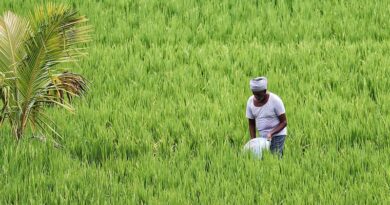Moa Technology wins World Economic Forum award for research tackling herbicide-resistant weeds
30 October 2023, UK: Moa Technology, the agricultural biotechnology (agribio) company tackling herbicide-resistant weeds that threaten the world’s food security, announces that it has won an award from UpLink, the World Economic Forum’s open innovation platform, as part of its Smarter Climate Farmers Challenge.
Moa’s selection as a Top Innovator in UpLink’s Smarter Climate Farmers Challenge means it will receive targeted support, networking, and mentorship to help scale its pioneering work. It was selected from more than 240 applications and is one of 12 winners.1
Herbicide-resistant weeds threaten agricultural productivity and are a major problem for growing numbers of farmers across the world. Without effective herbicides, farmers can lose up to 40% of their crop yield as a result of weed growth.
Moa uses the same kinds of advanced approaches employed in health and medicine-focused biotech to identify, understand, and develop next-generation herbicides with game-changing speed and accuracy. Specifically, it aims to develop herbicides with novel modes of action (MOAs), based on small molecule and natural product approaches.
The Company, which was spun out of the University of Oxford in 2017, today employs over 60 people, and last year completed a £35m ($44m) series B funding round.
Virginia Corless, CEO of Moa Technology, says, “We are delighted to receive this award, especially since it will help draw attention to major challenges facing farmers across the world, including herbicide resistance.“
Just as antibiotic-resistant bacteria have evolved, and threaten the effectiveness of certain medicines, so herbicide-resistant weeds threaten agricultural productivity. This is creating a crisis in agriculture, threatening farmers’ livelihoods and their ability to feed the world.
The opportunities for agribio companies to address challenges facing farmers are huge and vitally important, especially amid climate change and population growth. It’s critical that scientists take the kind of cutting-edge biotechnology so successfully applied to human health and apply it rigorously and responsibly to agriculture on an international basis.
We are particularly excited to be joining the Top Innovators network and look forward to engaging with other pioneering companies. Solving problems in agriculture will require many solutions used together, and it is vital that companies engage with each other and foster innovation.
Next-generation herbicides will play an important role in combating climate change. If weeds are allowed to reduce agricultural productivity, farmers will need to use more land, fertilizer, diesel, and other inputs to produce the same amount of food, substantially increasing carbon emissions. Increased land use for farming would also reduce natural carbon sequestration, as well as impacting biodiversity and general resilience.
Effective herbicides also reduce the need for ploughing to control weeds. Ploughing can damage soil, reduce productivity, and increase carbon emissions.
Furthermore, farmers will need effective herbicides to grow new crops and contend with new weed mixes as crop-growing areas shift amid climate change.
Also Read: Innovative Label Design: Revolutionizing Agrochemical Packaging in India
(For Latest Agriculture News & Updates, follow Krishak Jagat on Google News)















